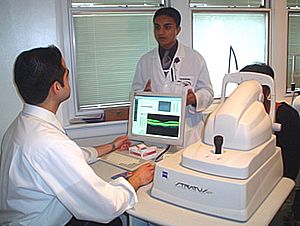The Department of Ophthalmology at the George Washington University School of Medicine and Health Sciences has made significant contributions in clinical research. Our research has been presented at several national and international meetings, and we are currently participating in several multi-center clinical trials.
Current Ongoing Research

The Diabetic Retinopathy Clinical Research Network is a collaborative network dedicated to facilitating multicenter clinical research of diabetic retinopathy, diabetic macular edema, and associated conditions. The DRCR.net supports the identification, design, and implementation of multicenter clinical research initiatives focused on diabetes-induced retinal disorders. Principal emphasis is placed on clinical trials, but epidemiologic outcomes and other research may be supported as well.
Diabetic Retinopathy clinical Network Studies:
- A Phase II Evaluation of Topical NSAIDs in Eyes with Non-Central Involved DME (Protocol R): This study is being conducted to assess the effects of topical NSAIDs on macular retinal volume compared with placebo in eyes with non-central DME.
- Intravitreal Bevacizumab Compared with Intravitreal Ranibizumab for Diabetic Macular Edema (Protocol T): The primary objective of the proposed research is to determine if intravitreal bevacizumab is non-inferior with regard to efficacy and safety compared with ranibizumab when given to treat center-involved DME in eyes with visual acuity of 20/32 to 20/320.
- Prompt Panretinal Photocoagulation Versus Intravitreal Ranibizumab with Deferred Panretinal Photocoagulation for Proliferative Diabetic Retinopathy (Protocol S): The primary objective of the protocol is to determine if visual acuity outcomes at 2 years in eyes with PDR that receive anti-VEGF therapy with deferred PRP are non-inferior to those in eyes that receive standard prompt PRP therapy. Phase III, prospective, multi-center randomized clinical trial.
A Non-Treatment Study of Risk Factors for Nonarteritic Anterior Ischemic Optic Neuropathy (NAION)-Sponsored by Pfizer
Study Objective: The objective of this case-crossover study is to examine whether use of PDE5 inhibitors, including the use of sildenafil, vardenafil, or tadalafil, triggers the onset of acute NAION within a pharmacokinetically defined time period (approximately 5 half-lives) following drug ingestion. Acute NAION is characterized by its sudden onset and is experienced by the patient as an abrupt visual change, often first detected upon awakening.